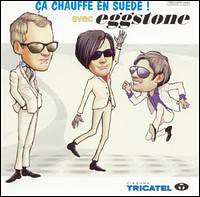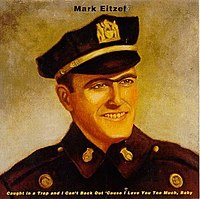
Eggstone, Sweden's "godfathers of Swedish pop", made a number of great, fizzing guitar-pop albums during the 1990's, and the compilation Ca Chauffe en Suede (1999) has songs from each of the three albums and a couple of singles, released between 1992 - 1997. These really are great songs, silly, lighter than air, but gloriously cheerful, alive with that pretend idea of riviera life in the 60's. These are records that fit precisely between episodes of the Persuaders and the records of the Concretes, it's great stuff, inconsequential in the way that the very best pop music is, but still beautifully put together and really smart. It's no surprise that this compilation was released by Bertrand Burgalat's Tricatel label in France, or that the liner notes are by St. Etienne's Bob Stanley, and in many ways Eggstone sit perfectly in Burgalat and St. Etienne's company. Forget the terrible record cover, and listen to the tunes and you're immediately in a world of delicate kitsch of the very best kind.

The term "industrial" may have become a meaningless word applied to rubbish pop records by Nine Inch Nails and Ministry, but once upon a time its meaning was quite specific and pioneering early industrial record, Kollaps (1982) by Einsturzende Neubaten makes clear why. Composed of noise experiments constructed out of mainly percussion played on electric drills and random scraps of metal over which Blixa Bargeld yelps and screams and whimpers, Kollaps is a brutally uncompromising record which has at its heart a genuine interest in the result of conflating brutal, complex and random noise with a strict and inflexible rhythm. In the end, the whole record is probably best summed up by the "mood" list on AllMusic: "Aggressive, Bleak, Cerebral, Detached, Fiery, Intense, Manic, Visceral, Confrontational, Eerie, Harsh, Malevolent, Menacing, Ominous, Volatile". Well, there you have it. No fun, but pretty clever.

What on earth could be less appealing than teenage trustafarian Christians playing "melodic rock"? Well, the answer should of course be nothing, and yet there's something that really strikes me about Eisley's debut album, Room Noises (2005). I think it's because there's something weirdly off-kilter about the songs that make them always do something that's not quite what you'd expect. It's an odd combination of a glossy, major label feel with a genuinely indie mentality rather than a pretend one. Some of the songs on Room Noises are a little corny, but for the most part not, and there are some great songs with funny little touches and although on the surface it might seem to be a record that wouldn't be out of place playing in an All Bar One, closer examination reveals a much more quirky, odd little sensibility throughout.

Our Mark Eitzel section should have started with the two songs from the "Take Courage" 7" (1990), but neither of them are on the internetosphere so we have to go straight on to the live album, Songs of Love (1991). Eitzel's grip on both life and the American Music Club seems have been slipping at the time, AMC having recorded their best album to date and been rewarded for it by being dumped by their label, and Songs of Love is a remarkable document of a great songwriter coming to the end of the line. It's a fabulous, straight from the mixing desk, piece of work and although I've seen Eitzel play solo and with AMC a number of times, I've never heard him this raw. There's little of the low-life tourist about Eitzel, I'm happy to believe that he really has lived through some pretty rough times and seen some pretty bleak things, and the abject desperation that underlies most of his work is brought starkly to the fore when it's just Eitzel and an acoustic guitar. Most of the material on Songs of Love is taken from Everclear, the album he had just recorded but there are unexpected choices from the earlier albums which are revealing, showing that if anything Eitzel's touch has lightened as he's got older, or maybe it's just that he's grown more astute at clothing true misery in more colourful outfits.

Eitzel didn't release another solo album until he had dissolved AMC for the first time. 60 Watt Silver Lining (1996) is therefore in some ways his first "official" solo album, and it's a very different type of record to Songs of Love. The whole album is underscored by a slightly jazzy piano and although Eitzel's trademark gloom is present and correct, there's a lightness of touch to the record which is surprising. The opener is a gentle cover of Carole King's 'No Easy Way Down', which is unexpected to begin with, but it's followed by a breezy, almost joyful 'Sacred Heart' and it's clear either something has happened in Eitzel's life or else he's just experimenting with cheering up musically. Either way, it doesn't feel off, if anything time has been kind to 60 Watt Silver Lining, and it sounds better than ever, now that the surprise has worn off. There are some lovely songs here and 'Mission Rock Resort' and 'Cleopatra Jones' positively bounce along. There are, of course, plenty of miseries along the way ('Wild Sea' and 'When My Plane Finally Goes Down' are pretty grim), but even they have a life to them to is new for Eitzel, and dismal closer 'Everything is Beautiful' is really wonderful.

Eitzel's next move was a collaboration with REM's Peter Buck. Unfortunately West (1997) does little more than reveal weaknesses in both Eitzel and Buck's songwriting at that point and bearing in mind that most of these tunes were already written and intended to appear on the next REM album it's evident that the rot that had set into REM with Out of Time was destined to continue. There's an insidious lifelessness to these songs and Eitzel's vocal melodies struggle to find a hold or true melodicism and to me the album staggers forward with rather a listless air. It's a shame because there are the bones of some lovely songs on West but they all sound as if they could have done with a lot more work before being recorded. There are some jolly tunes and some gloomy tunes, but it all sounds like treading water, even like not really bothering to try to hard and it leaves an unsatisfactory feeling when it's all over. After West is the unwieldingly Elvis-quotingly titled Caught In a Trap and I Can't Get Out Because I Love You Too Much Baby (1998), which I only have on vinyl and from which there are only a handful of songs on the internet. It's another stripped down album, mostly Eitzel and guitar only, but with occasional help from the likes of Yo La Tengo's James McNew. The songs on Caught in a Trap are pretty dour compared to West but it's a step forward again, bringing Eitzel back to what he really does best. However, I won't say much more about it because I haven't been able to listen to it properly for the purposes of this exercise...


More Eitzel tomorrow.
No comments:
Post a Comment